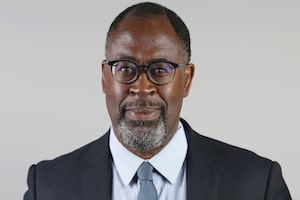Preston Manning and Mike Harris take part in a panel discussion during the Canada Strong and Free conference in Ottawa on May 6.Sean Kilpatrick/The Canadian Press
Former Reform Party leader Preston Manning says he is concerned by the personal and divisive tone of the Conservative Party’s leadership race after witnessing this week’s combative candidates’ debate.
“My caution has been, I worry about the internal competition getting too personal. I’d like to see them stick to the principles and policies,” he told journalists attending the 14th annual conference of the Canada Strong and Free Network – which was formerly called the Manning Centre, after Mr. Manning.
“My worry is frankly with you media folk. If somebody gets up there, says some extreme thing, criticizing others, that’ll be the headline even if somebody else comes up with the answer to sliced bread.”
Despite his concerns, Mr. Manning acknowledged that much of the debate was focused on issues, with the candidates trying out their positions and fine-tuning their presentation styles.
Alberta Premier Jason Kenney, who was in the audience for the debate and is attending the conference, said in a brief interview on Friday that the debate was “fiery.” He declined to elaborate, but did say he was not endorsing a candidate at this point.
Conservative leadership debate was more about who supported trucker convoy first
Pierre Poilievre, Jean Charest spar over trucker convoy, Huawei in Conservative leadership debate
Five of six Conservative leadership candidates attended the debate, which was organized by the Canada Strong and Free Network. They were Ontario MPs Leslyn Lewis and Pierre Poilievre; former Quebec premier Jean Charest; and Roman Baber, who was an independent member of the Ontario Legislature.
Brampton, Ont., Mayor Patrick Brown, who is also a Conservative leadership candidate, did not attend the debate because, his campaign said, he was too busy holding events.
On Friday, Mr. Brown sent an e-mail to party members, in which he claimed the media had declared him the debate’s winner for not attending. He said he was instead in Atlantic Canada, doing work to grow the party.
He wrote that the debate was a shouting match, “full of interruptions, mistruths, and over-the-top attacks designed to score cheap social media sound bytes.”
“After watching the debate, I can’t help but wonder: how can any of these candidates expect to unite our party and expand our Conservative coalition if they’re already adopting a scorched earth approach?”
During the 90-minute debate, Mr. Poilievre and Mr. Charest sparred over issues that included Mr. Poilievre’s support for February’s trucker convoy protests, which brought central Ottawa to a standstill and led to intermittent closings at several border crossings.
Other points of contention were Mr. Charest’s work for Chinese tech company Huawei, and his credentials as a Conservative, considering the fact that he was leader of the Quebec Liberal Party – a coalition federalist party – until 2012.
Ms. Lewis pressed Mr. Poilievre to disclose his personal views on abortion, amid debate over the issue prompted by the prospect of a U.S. Supreme Court ruling that would overturn Roe v. Wade.
Later this month, the candidates will reconvene at a pair of party-organized, official debates: one in Edmonton next week, and the other in Montreal on May 25.
For now, the leadership hopefuls are on the campaign trail, working toward a June 3 deadline to sell Conservative Party memberships. Because only members can cast ballots in the leadership election, candidates who sell large numbers of memberships increase their chances of winning the vote, whose results will be announced on Sept. 10.
Interim federal Conservative leader Candice Bergen said in a video address to the conference on Friday that she welcomes a combative race.
“Leadership races mean criticism, which can be tough and sometimes unforgiving,” she said.
While she said she agreed with Mr. Manning’s call for candidates to avoid personal attacks, she argued that politics is a clash of values.
“This is not a battle for the faint of heart,” she said, adding that the race has created excitement and engaged thousands of Canadians.
For subscribers: Get exclusive political news and analysis by signing up for the Politics Briefing.
 Ian Bailey
Ian Bailey